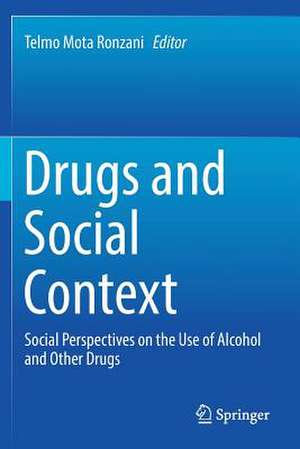Drugs and Social Context: Social Perspectives on the Use of Alcohol and Other Drugs
Editat de Telmo Mota Ronzanien Limba Engleză Paperback – 18 mai 2019
The social approach adopted in this volume challenges this dichotomy and analyzes both the social contexts to which drug use is related and the social and political consequences of the attitudes and policies adopted by governments and other social groups towards drug users, addressing topics such as:
- Drugs and poverty
- Drugs and gender
- Drugs and race
- Drugs and territory
- Stigmatization of drug use
- Prohibitionism
| Toate formatele și edițiile | Preț | Express |
|---|---|---|
| Paperback (1) | 706.97 lei 6-8 săpt. | |
| Springer International Publishing – 18 mai 2019 | 706.97 lei 6-8 săpt. | |
| Hardback (1) | 713.70 lei 6-8 săpt. | |
| Springer International Publishing – 8 feb 2018 | 713.70 lei 6-8 săpt. |
Preț: 706.97 lei
Preț vechi: 744.18 lei
-5% Nou
Puncte Express: 1060
Preț estimativ în valută:
135.29€ • 140.39$ • 113.08£
135.29€ • 140.39$ • 113.08£
Carte tipărită la comandă
Livrare economică 17-31 martie
Preluare comenzi: 021 569.72.76
Specificații
ISBN-13: 9783319891835
ISBN-10: 3319891839
Pagini: 114
Ilustrații: XVIII, 114 p.
Dimensiuni: 155 x 235 x 11 mm
Greutate: 0.2 kg
Ediția:Softcover reprint of the original 1st ed. 2018
Editura: Springer International Publishing
Colecția Springer
Locul publicării:Cham, Switzerland
ISBN-10: 3319891839
Pagini: 114
Ilustrații: XVIII, 114 p.
Dimensiuni: 155 x 235 x 11 mm
Greutate: 0.2 kg
Ediția:Softcover reprint of the original 1st ed. 2018
Editura: Springer International Publishing
Colecția Springer
Locul publicării:Cham, Switzerland
Cuprins
Section 1. Drugs and Society.- Chapter 1.The context of drug use in the consumer society.- Chapter 2. The stigmatization of drug use as mechanism of legitimation of exclusion.- Chapter 3. Social Effects of Prohibitionism in the Americas and New Drug Policies.- Section 2. Social Issues.- Chapter 4.Drugs and Poverty: interfaces of oppression in the capitalist world.- Chapter 5.Drugs and Gender.- Chapter 6. Drugs and Race.- Chapter 7. (Des)Occupation of urban and rural spaces, gentrification and drug use.
Notă biografică
Telmo Mota Ronzani is a professor of the Department of Psychology at the Federal University of Juiz Fora, Brazil. Dr. Ronzani holds a PhD in Sciences from the Federal University of São Paulo and is an international expert in the area of alcohol and other drugs. He has published 6 books, 43 chapters and 101 scientific papers in the field, is an ad hoc advisor to the Brazilian government in the drug policy area and works as a collaborator and assessor of international organisms on drugs such as World Health Organization, United Nations Office on Drugs and Crime (UNODC) and Inter-American Drug Control Commission (CICAD).
Textul de pe ultima copertă
This book goes beyond the traditional approaches to drug use and discusses the issue from a societal perspective, integrating contributions from different disciplines such as psychology, public health, anthropology, law, public policies and sociology to address specifically the social aspects of the phenomenon. Given its complexity, drug use demands a multidisciplinary approach from many different perspectives, but despite the vast literature about the topic, the majority of the books are restricted either to a purely medical perspective (focused mainly on treatment techniques) or to a criminological perspective (focused mainly on drug trafficking and organized crime).
The social approach adopted in this volume challenges this dichotomy and analyzes both the social contexts to which drug use is related and the social and political consequences of the attitudes and policies adopted by governments and other social groups towards drug users, addressing topics such as:
The social approach adopted in this volume challenges this dichotomy and analyzes both the social contexts to which drug use is related and the social and political consequences of the attitudes and policies adopted by governments and other social groups towards drug users, addressing topics such as:
- Drugs and poverty
- Drugs and gender
- Drugs and race
- Drugs and territory
- Stigmatization of drug use
- Prohibitionism
Caracteristici
Goes beyond the biomedical approach and analyzes the macrosocial factors related to drug use Integrates contributions from psychology, public health, anthropology, law, public policies and sociology Shows how some traditional approaches to drug use have served as mechanisms to legitimate social control, exploitation and maintenance of social exclusion
